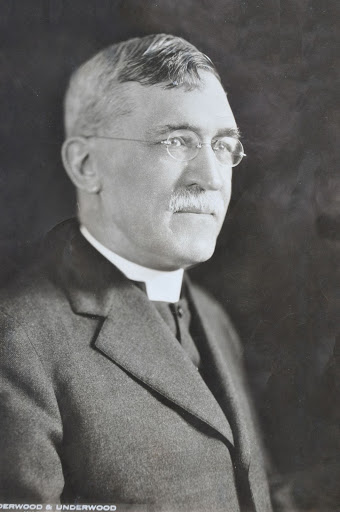When the state of Georgia split into two Episcopal dioceses, Bishop C.K. Nelson became the first bishop of the Diocese of Atlanta. Within the new bounds of the Diocese of Georgia, transportation to churches and income for ministry both presented significant issues for whoever would become the bishop of the southern 2/3s of the state. As to transportation, only local trains on two secondary branches of the Coast Line and Seaboard served south Georgia. They arrived at all of the western points in the diocese at two o’clock in the morning and returned to Savannah at about the same hour. This made for a difficult travel schedule for a bishop. With regard to money for mission, the Diocese of Atlanta retained the endowments which had been left in the wills of faithful churchmen and women even of the Coastal area. The sole endowment remaining was the Dodge Fund that could only be used for the education of poor boys.
 Despite the challenges, there were seven nominees for bishop–two were clergy from within the diocese while five were serving elsewhere in the southeast. Frederick Focke Reese was among the three leading candidates on the first ballot and was elected by majority vote of both lay and clergy orders on the fourth ballot. Born in Baltimore, Maryland on October 23, 1854, Reese graduated from the University of Maryland and Berkeley Theological Seminary (at Yale University) before his ordination to the priesthood in 1877. He served as an Episcopal priest in Baltimore, then in Virginia. He was well known in the Diocese as he had served as the Rector of Christ Church in Macon, during which time he was the Secretary of the Convention of the Diocese of Georgia. At the time of his election, Reese was the Rector of Christ Church, Nashville. He was consecrated in Christ Church, Savannah on May 20, 1908. Almost immediately, poor health caused the newly elected bishop to take an extended leave of absence. He resumed ecclesiastical duties April 1, 1909.
Despite the challenges, there were seven nominees for bishop–two were clergy from within the diocese while five were serving elsewhere in the southeast. Frederick Focke Reese was among the three leading candidates on the first ballot and was elected by majority vote of both lay and clergy orders on the fourth ballot. Born in Baltimore, Maryland on October 23, 1854, Reese graduated from the University of Maryland and Berkeley Theological Seminary (at Yale University) before his ordination to the priesthood in 1877. He served as an Episcopal priest in Baltimore, then in Virginia. He was well known in the Diocese as he had served as the Rector of Christ Church in Macon, during which time he was the Secretary of the Convention of the Diocese of Georgia. At the time of his election, Reese was the Rector of Christ Church, Nashville. He was consecrated in Christ Church, Savannah on May 20, 1908. Almost immediately, poor health caused the newly elected bishop to take an extended leave of absence. He resumed ecclesiastical duties April 1, 1909.
In his first address to convention in 1909, Bishop Reese spoke of the difficulty in finding priests for the mission stations of the Diocese. He said, “It is cold comfort to ask our mission stations to be patient; they have been patient; but we must ask them, in considering the matter, to bear in mind the great difficulty which confronts us.”
His successor, Bishop Middleton Barnwell, said of Reese’s tenure, “Again and again he plead, and for a long time in vain, for enough money to raise the salaries of married missionaries to $1,200 a year. $800 seems to have been almost the maximum. He had no travel allowance to speak of, he rented his own house, he had nothing to build with in the mission field and his own salary was often far in arrears. We owed him something like $2,500 in back salary when I came to Georgia in 1935.”
Through the years, Bishop Reese would address conventions about how our churches were seen as strange and different as our manner of worship is different from our neighbors. But he remained steadfast in the conviction that we must share our faith. He told the diocesan convention in 1929, “Christianity is either a missionary religion or it is nothing, and every Christian is a missionary or he denies the faith in his life, if not in his words.”
